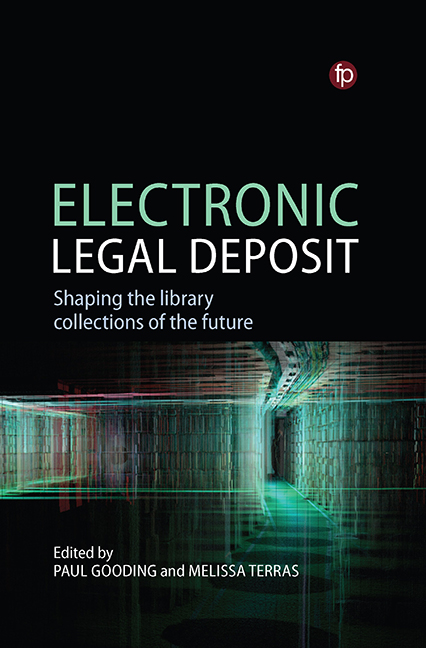Book contents
- Frontmatter
- Dedication
- Contents
- Figures and Tables
- Contributors
- Foreword
- Introduction
- PART 1 INSTITUTIONS AND IMPLEMENTATION
- 1 UK Non-Print Legal Deposit: From Regulations to Review
- 2 The Influence of Legal Deposit Legislation on the Digital Collections of the National Library Of Scotland
- 3 E-legal Deposit at the Biblioteca Nacional de México (National Library of Mexico)
- 4 Bibliographic Control in Zimbabwe: the Conundrum of Legal Deposit in the age of Digital Technologies
- 5 Electronic Legal Deposit in Sweden: the Evolution of Digital Publications and Legislative Systems
- PART 2 USERS AND CONTEXTS
- 6 Publishers, Legal Deposit and the Changing Publishing Environment
- 7 Making History: Digital Preservation and Electronic Legal Deposit in the Second Quarter of the 21st Century
- 8 Giving with one Click, Taking with the Other: Electronic Legal Deposit, Web Archives and Researcher Access
- 9 Follow the Users: Assessing UK non-print Legal Deposit within the Academic Discovery Environment
- 10 ‘An Ark to Save Learning from Deluge’? Reconceptualising Legal Deposit After the Digital Turn
- Index
4 - Bibliographic Control in Zimbabwe: the Conundrum of Legal Deposit in the age of Digital Technologies
Published online by Cambridge University Press: 07 November 2020
- Frontmatter
- Dedication
- Contents
- Figures and Tables
- Contributors
- Foreword
- Introduction
- PART 1 INSTITUTIONS AND IMPLEMENTATION
- 1 UK Non-Print Legal Deposit: From Regulations to Review
- 2 The Influence of Legal Deposit Legislation on the Digital Collections of the National Library Of Scotland
- 3 E-legal Deposit at the Biblioteca Nacional de México (National Library of Mexico)
- 4 Bibliographic Control in Zimbabwe: the Conundrum of Legal Deposit in the age of Digital Technologies
- 5 Electronic Legal Deposit in Sweden: the Evolution of Digital Publications and Legislative Systems
- PART 2 USERS AND CONTEXTS
- 6 Publishers, Legal Deposit and the Changing Publishing Environment
- 7 Making History: Digital Preservation and Electronic Legal Deposit in the Second Quarter of the 21st Century
- 8 Giving with one Click, Taking with the Other: Electronic Legal Deposit, Web Archives and Researcher Access
- 9 Follow the Users: Assessing UK non-print Legal Deposit within the Academic Discovery Environment
- 10 ‘An Ark to Save Learning from Deluge’? Reconceptualising Legal Deposit After the Digital Turn
- Index
Summary
Introduction
This chapter describes the functions of current legislation in ensuring compliance with legal deposit laws of Zimbabwe. It seeks to highlight the challenges that the existing legal deposit laws face vis-à-vis the open access regime. It analyses the legislation for bibliographic compilation in the context of the shifts in the global knowledge landscape. The chapter discusses the weaknesses of the current law with reference to current trends in the legal deposit of multimedia formats. It also examines how bibliographic control can underpin national development goals concerning teaching, learning and research. The authors explain how the absence of a print and online version of a national bibliography affects collection development and scholarly research, and explore the challenges of harmonising print and electronic records in the context of digital divide. Recommendations on possible strategies to utilise modern technologies to capture, process and preserve library records as national heritage in Zimbabwe are suggested.
Universal bibliographic control (UBC) as a global system for the control and exchange of bibliographic information acknowledges the resource discovery metadata requirements of modern, global-scale users of information (Dunsire, Hillmann, and Phipps, 2012). The sheer size of global bibliographic control is enormous, as it encompasses the creation and maintenance of a complete record of the sum of human knowledge. Žumer (2009) defines a national bibliography as the accumulation of the authoritative and comprehensive records of the national imprints of a country, which is published regularly and with the least possible delay.
Thapa (2009, 57) views bibliographic control as the activities involved in the process of creating, organising, managing and maintaining the files of bibliographic records, for example the library or archival materials or sources listed in an index, or database, or virtual repository. As such, the locatability, findability, discoverability, accessibility, retrievability and shareability of scientific scholarly content is possible through effective bibliographic control because of scientific description and subject access through uniform catalogue codes, classification schemes and name authorities to enhance precision. Bibliographic tools are published in line with the International Federation of Library Associations and Institutions’ (IFLA’s) International Standard Bibliographic Description (ISBD) published in 2011.
- Type
- Chapter
- Information
- Electronic Legal DepositShaping the Library Collections of the Future, pp. 77 - 98Publisher: FacetPrint publication year: 2019

